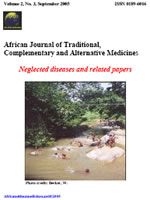
|
African Journal of Traditional, Complementary and Alternative Medicines
African Ethnomedicines Network
ISSN: 0189-6016
Vol. 9, No. 3s, 2012, pp. 47-63
|
 Bioline Code: tc12070
Bioline Code: tc12070
Full paper language: English
Document type: Research Article
Document available free of charge
|
|
|
African Journal of Traditional, Complementary and Alternative Medicines, Vol. 9, No. 3s, 2012, pp. 47-63
| en |
Evaluation of Traditional Medicines III: The Mechanism of Immune Modulation by PHELA.
Lekhooa, Makhotso; Walubo, Andrew; Plessis, Jan JB Du & Matsabisa, Motlalepula G.
Abstract
PHELA is a herbal traditional medicine that is under development for use as an immune booster in immune compromised
individuals. Therefore, the aim of this study was to determine PHELA’s mechanism of action by observing for changes in cytokine profiles.
Four groups of Sprague Dawley rats (n = 8) were treated daily and separately with normal-saline, cyclosporine-A, PHELA-only and PHELA+
cyclosporine-A. Thereafter, 4 animals from each group were sacrificed after 7 and 14 days of treatment. Serum Th1 cytokines (IL-2, IFN-γ
and TNF-ά) and Th2 cytokines (IL-4 and IL-10) were measured by ELISA. The concentrations of Th1 cytokines in the PHELA-only treated
group were similar to the control group on days 7 and 14. However, the Th1 cytokines were higher in the PHELA+cyclosporine-A treated
group compared to cyclosporine-A group, and cyclosporine-A concentrations were similar in both groups. These results show that PHELA
did not stimulate Th1 cytokines of a normal immune system but stimulated them when the immune system was suppressed by cyclosporine-
A. In conclusion, PHELA is an immune-stimulant to a compromised immune system.
Keywords
PHELA; traditional medicine; cyclosporine-A; cytokines; immune stimulant
|
| |
© African Journal of Traditional, Complementary and Alternative Medicines
Alternative site location: http://journals.sfu.ca/africanem/index.php/ajtcam
|
|
